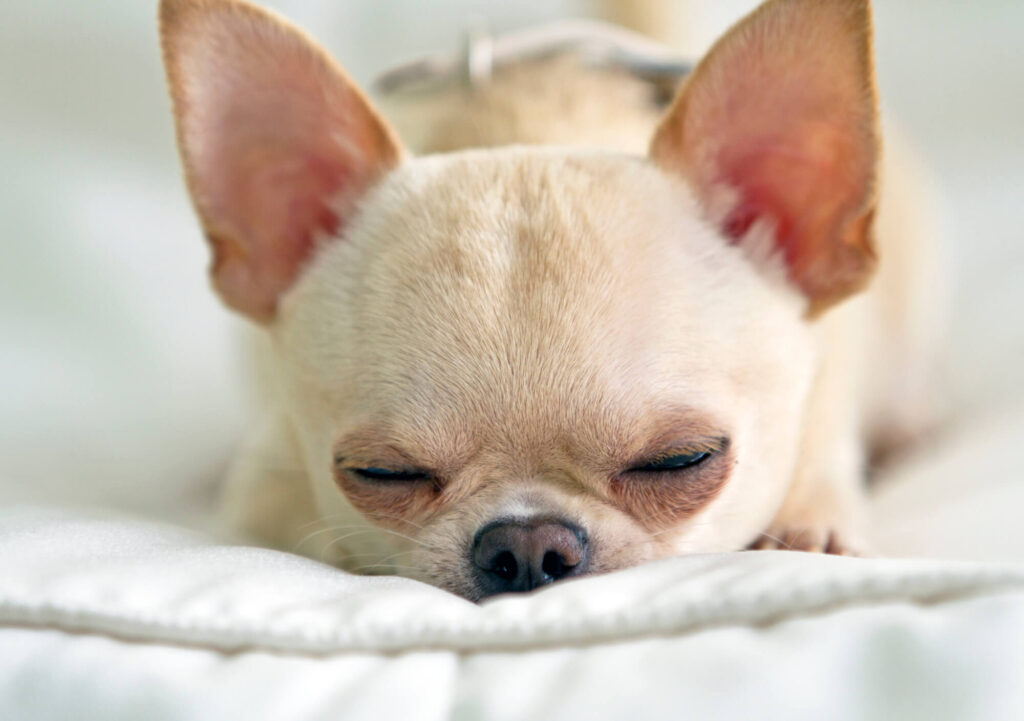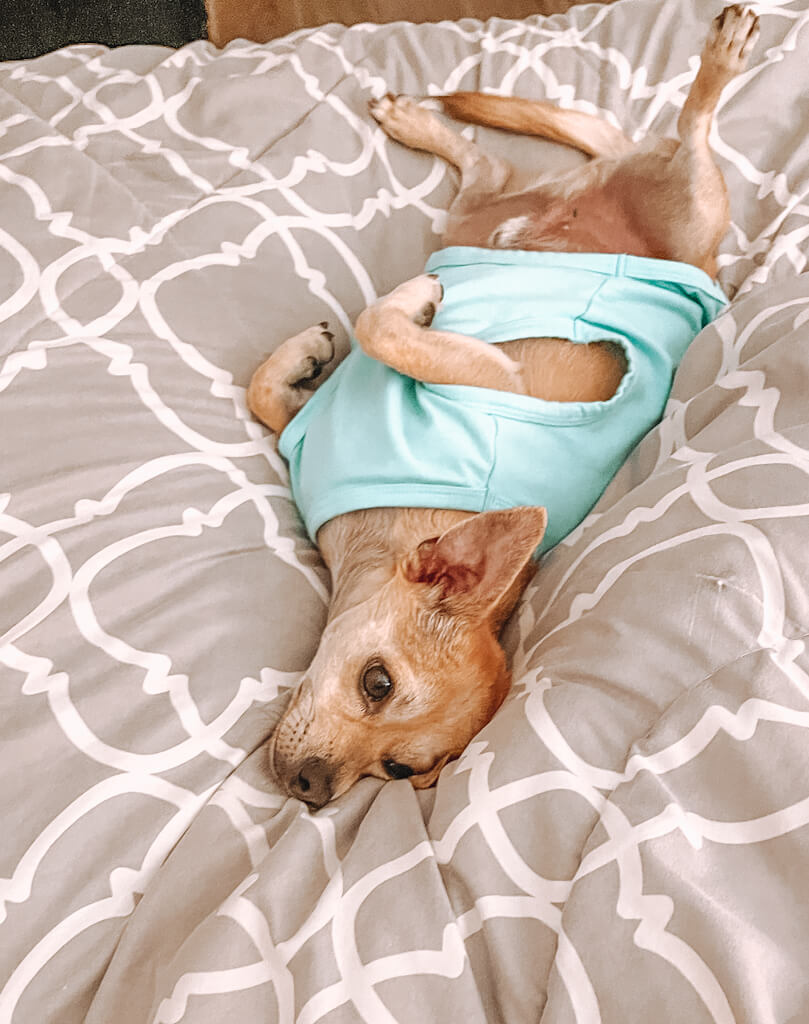Is Chihuahua Snoring Normal? Discover the Truth + 8 Tips
We’ve noticed that our Chihuahua, Leo, sometimes snores when he’s sleeping.
We’re sure many other Chihuahua owners have encountered this as well, but is snoring normal or is it a sign of an underlying health issue?
So if you’re wondering why do Chihuahuas snore or you’re looking for tips to reduce it, this blog post is for you!
Keep reading as we delve deeper into the reasons behind Chihuahua snoring and share some helpful remedies to stop or reduce their snoring so your beloved Chihuahuas can snooze more peacefully.
As fellow Chihuahua owners, we understand how concerning it can be to hear our little fur babies snore.
So, if you’ve caught your Chihuahua snoring away, let’s uncover the fascinating reasons behind this adorable canine habit.

Disclosure: this post may contain affiliate links, meaning we get a commission if you decide to make a purchase through our links, at no extra cost to you.
12 Reasons Why Chihuahuas Snore
1. Brachycephaly

Similar to brachycephalic dogs, apple-head Chihuahuas have a distinctive physical feature that contributes to their snoring tendencies.
Their characteristic short muzzle and round skull shape can result in a narrowing of the nasal passages and airways, leading to restricted airflow during sleep.
This narrowing causes turbulent airflow, which in turn creates vibrations in the soft tissues of the throat, resulting in the familiar snoring sound.
The size and structure of their airways can vary among individual Chihuahuas, which can influence the severity of their snoring.
2. Allergies
Just like humans, Chihuahuas can develop allergies to various environmental factors such as pollen, dust mites, mold, or certain foods.
When a Chihuahua is exposed to an allergen, their immune system reacts, leading to inflammation and swelling of the nasal passages.
The swelling can cause a partial or complete obstruction of the airway, making it difficult for the air to pass through freely during sleep.
This results in snoring as their body attempts to compensate for the restricted airflow.
3. Obesity

If you’re thinking, why does my Chihuahua snore, and they are a bit overweight, that could be the reason why.
In 2022, 59% of dogs were classified as overweight or obese.
It is a growing problem and can contribute to issues such as osteoarthritis, type 2 diabetes, a reduction in lifespan, and more.
When Chihuahuas carry excess weight, it can lead to the accumulation of fatty tissue in various parts of their body, including the throat area.
This excess fatty tissue can narrow the airway passage and put pressure on the surrounding tissues.
As a result, airflow becomes restricted during breathing, causing vibrations that manifest as snoring sounds.
Extra weight can also strain the respiratory system, making it more challenging for Chihuahua to breathe comfortably, especially during sleep.
The excess weight also puts more pressure on their joints, possibly causing them to lay down to eat.
4. Dental Problems
Why do Chihuahuas snore? Dental problems can have a surprising impact on Chihuahuas’ snoring tendencies.
Issues such as tooth decay or periodontal disease can contribute to the narrowing of their airways and lead to snoring.
When Chihuahuas experience dental problems, the gums can become inflamed and swollen.
This inflammation can extend to the throat area, causing a reduction in the airway passage.
As a consequence, the flow of air becomes obstructed, which manifests as snoring.
5. Reverse Sneezing
Reverse sneezing is a peculiar condition that can cause Chihuahuas to snort and snore.
It is characterized by sudden, rapid inhalations accompanied by a snorting or honking sound.
This behavior occurs when a Chihuahua experiences irritation in their throat or upper respiratory tract, triggering a reflexive response to remove the irritant.
Unlike a typical sneeze, which expels air forcefully, reverse sneezing involves the inward movement of air.
Chihuahuas will extend their neck, stand still, and make repeated snorting or honking noises. Reverse sneezing episodes can be alarming for owners, but they are usually harmless and brief.
Common triggers for reverse sneezing in Chihuahuas include allergies, irritants in the environment, excitement, exercise, or even drinking or eating too quickly.
Read next: All About Chihuahua Reverse Sneezing + 6 Tips
6. Collapsed Trachea
A collapsed trachea is a prevalent condition among Chihuahuas that can significantly impact their breathing and contribute to snoring.
The trachea, also known as the windpipe, is composed of cartilage rings that provide structural support and keep it open.
However, in Chihuahuas, these cartilage rings can weaken over time, leading to a collapse of the trachea.
When the trachea collapses, it narrows the airway passage, causing a range of respiratory symptoms.
Chihuahuas with a collapsed trachea may experience snoring as the restricted airflow generates vibrations in the throat tissues.
A narrowed trachea can also make it difficult for a Chihuahua to breathe comfortably, especially during exertion or excitement.
If your Chihuahua displays signs of respiratory distress, such as wheezing, coughing, or labored breathing, take them to the vet right away.
7. Nasal Passage Blockage
Nasal passage blockages are a common cause of snoring in Chihuahuas.
Various factors can contribute to these blockages, including mucus buildup, inflammation, or physical obstructions such as nasal polyps.
When the nasal passages become congested or narrowed, it hinders the smooth flow of air during breathing, resulting in snoring.
Mucus buildup can occur due to allergies, respiratory infections, or irritants in the environment.
The excess mucus can clog the nasal passages, making it harder for the Chihuahua to breathe freely and causing snoring as air attempts to pass through the narrowed space.
Inflammation of the nasal tissues can also lead to blockages.
Allergies, infections, or irritants can trigger an inflammatory response, causing the tissues to swell and constrict the nasal passages.
This constriction restricts the airflow, resulting in snoring sounds.
Physical obstructions like nasal polyps, which are noncancerous growths in the nasal passages, can create blockages that contribute to snoring as well.
8. Sleeping Position

Your Chihuahua’s sleeping positions play a role in their snoring tendencies as well. Certain sleeping positions, such as lying on their back, can contribute to snoring episodes.
When Chihuahuas sleep on their backs, their tongue and soft tissues in the throat area may relax and shift backward, partially obstructing the airway, which results in snoring.
The position of the tongue is particularly significant in this context, as its relaxation and descent can cause it to impede the passage of air.
Read next: 6 Best Beds for Chihuahuas
9. Upper Respiratory Infection
Upper respiratory infections can also contribute to snoring in Chihuahuas.
When Chihuahuas contract an upper respiratory infection, such as a viral or bacterial infection, it can lead to inflammation and increased mucus production in the respiratory tract.
The inflammation and excess mucus can result in the narrowing of the airways, making it more difficult for the Chihuahua to breathe freely.
As a consequence, snoring may occur as the airflow encounters resistance and turbulence caused by the restricted air passages.
The combination of inflammation and mucus can obstruct the nasal passages, throat, and even the smaller airways in the lungs, causing snoring sounds during breathing.
Chihuahuas with upper respiratory infections may also display other symptoms, such as nasal discharge, sneezing, coughing, or difficulty breathing.
Prompt veterinary attention is crucial in these cases to diagnose and treat the underlying infection.
10. Obstruction
Any obstruction in your Chihuahua’s airways can cause snoring.
Various factors, such as tumors or foreign objects, can impede the smooth passage of air and lead to snoring episodes.
When a Chihuahua has an obstruction in their airway, whether it be a tumor or a foreign object, the available space for air to flow becomes restricted.
The obstruction acts as a barrier, disrupting the normal airflow during breathing.
The airflow then becomes turbulent and generates vibrations within the respiratory system, manifesting as snoring sounds.
Tumors within the airways can physically obstruct the passage of air, while foreign objects, such as small toys or debris, can create a partial blockage.
In both cases, the reduced space for air to travel through the airways causes snoring.
11. Hypothyroidism
Hypothyroidism, a condition where the thyroid gland doesn’t produce enough hormones, can be a contributing factor to snoring in dogs.
The thyroid gland plays a crucial role in regulating various bodily functions, including metabolism and muscle tone.
When a dog experiences hypothyroidism, the low levels of thyroid hormones can lead to a decrease in metabolism, causing weight gain and accumulation of excess fat.
The excess weight, particularly in the neck and throat area, can contribute to the narrowing of the airway passage.
12. Medication Side Effects
Finally, certain medications may cause snoring as a side effect.
Medications that have sedative or muscle relaxant properties can potentially relax the muscles around the throat, which can result in snoring. When the muscles in the throat become overly relaxed, they may partially obstruct the airway during sleep, causing vibrations that produce snoring sounds.
Sedatives or muscle relaxants are often prescribed to help manage various conditions in Chihuahuas, such as anxiety or muscle spasms.
Should You See a Vet For Snoring?
As pet owners, we all want what’s best for our furry friends. When we notice our Chihuahuas snoring, it’s natural to ask if we should take them to the vet.
Most of the time, snoring in Chihuahuas is harmless and not a cause for serious concern. However, there are instances where a visit to the vet is warranted.
First, determine if their snoring is consistent and if there are accompanying symptoms.
Some of the signs that may warrant a vet visit include:
- Excessive gasping or difficulty breathing
- Fatigue or decreased energy levels
- Restlessness during sleep
- Interrupted sleep patterns
These symptoms may indicate underlying health issues like sleep apnea, obesity, or allergies – all of which can contribute to snoring.
If your Chihuahua’s snoring is accompanied by other symptoms or if you are concerned about their overall health and well-being, it’s essential to consult with a veterinarian.
Sometimes snoring may warrant further investigation or treatment.
Is Snoring in Dogs Normal?
Yes, snoring in dogs can be considered normal in most cases. Just like us humans, dogs can also snore when they sleep.
Certain dog breeds, such as Bulldogs and pugs, are more likely to snore than others due to their flat facial structure.
Occasional snoring should not be a cause for concern.
However, if you notice the snoring is accompanied by other symptoms like difficulty breathing, coughing, or excessive daytime sleepiness, it’s crucial to consult a veterinarian as it may be a sign of a more serious condition.
Tips to Reduce Snoring
Air Purifier

Investing in an air purifier for your Chihuahua would be a wise decision when it comes to creating a healthy environment for your furry companion.
Air purifiers are designed to effectively remove various allergens and pollutants from the air. HEPA filters are especially effective in capturing tiny particles like pollen, dust mites, and pet dander, and neutralizing odors, significantly improving the air quality in your home.
By capturing and filtering out these particles, air purifiers can significantly reduce the presence of potential respiratory triggers in your home.
This can reduce the likelihood of your Chihuahua experiencing respiratory issues, which may contribute to snoring.
Humidifier

Using a humidifier in your Chihuahua’s sleeping area can help maintain optimal humidity levels.
Dry air can be particularly troublesome for dogs, as it can lead to throat irritation and exacerbate existing snoring issues.
However, by using a humidifier, you can increase the humidity levels in the surrounding environment, effectively hydrating the air and minimizing throat discomfort for your Chihuahua.
The optimal humidity range for dogs generally falls between 30% and 50%, and a humidifier can help maintain these levels, preventing the air from becoming excessively dry.
Keep Your Chihuahua at a Healthy Weight
Maintaining a healthy weight is crucial for your Chihuahua’s overall well-being and can significantly impact their snoring tendencies.
Dogs that are overweight or obese are more prone to snoring due to the accumulation of excess fatty tissue in the throat area.
To mitigate this issue, focus on implementing a proper diet and exercise regimen to help your Chihuahua maintain a healthy weight.
Adult Chihuahuas should get around 30 minutes of exercise daily. We have a post with all kinds of games to play with your pup if you need some fresh ideas!
Read next: Chihuahua Exercise Guide
Elevate Your Chihuahua

Elevating your Chihuahua’s head while they sleep can help reduce snoring.
When their head is elevated during sleep, it helps to keep the airways open and prevents the soft tissues in the throat from collapsing or obstructing the air passage.
Use a specially designed dog bed or pillow to prop up their head. Our Chihuahua actually loves laying his head on pillows as if he were human.
This Bedsure Orthopedic Dog Bed will slightly elevate their head and it’s great for dogs with joint issues, too.

Keep Sleeping Area Clean
Dust, dirt, pet dander, and other allergens can accumulate in your Chihuahua’s bedding over time, contributing to respiratory issues and potentially exacerbating snoring.
Establish a regular cleaning routine for your Chihuahua’s sleeping area, usually once a week. This includes washing their bedding, blankets, and any clothes they wear.
Opt for fragrance-free and hypoallergenic detergents to minimize the risk of further irritation.
In addition to washing the bedding, it’s important to regularly vacuum the surrounding area to remove dust and pet hair.
Use a vacuum cleaner equipped with a HEPA filter, as this can effectively trap small particles and allergens.
Check Teeth and Dental Health
Good dental health is important for reducing snoring in your Chihuahua.
Regularly check your dog’s teeth and gums for signs of infection or inflammation, which may contribute to snoring.
Brush your dog’s teeth every day and schedule regular dental cleanings with your veterinarian to maintain good oral health.
We recommend this organic dog toothpaste and these small toothbrushes perfect for tiny Chihuahua mouths!
Chews are another way to keep up with your pup’s dental health. These 8 healthy chews will help scrape tartar off your pup’s teeth.
Use a Round Bed

A round bed can help ensure your Chihuahua sleeps in a curled position, which can reduce the risk of snoring.
This position helps to keep their airways open and can help promote a more peaceful night’s sleep.
Get Checked for Allergies
Finally, it’s important to have your Chihuahua checked for allergies.
Allergies can cause irritation and inflammation of the airways, leading to snoring.
If your dog does have allergies, working with your veterinarian to address the issue can help reduce snoring.
Conclusion
So there you have your answer to why do Chihuahuas snore!
Chihuahuas, like many other dog breeds, do indeed snore.
Snoring can be attributed to various factors, including anatomy, allergies, obesity, or even sleeping positions.
While occasional snoring is generally harmless, persistent or severe snoring may indicate underlying health issues that require attention.
Ultimately, understanding the reasons behind Chihuahuas’ snoring is essential for maintaining their health and ensuring they live a happy, restful life.
By addressing these causes and implementing appropriate care strategies, we can help our beloved pets enjoy a better quality of life.
Related posts:








